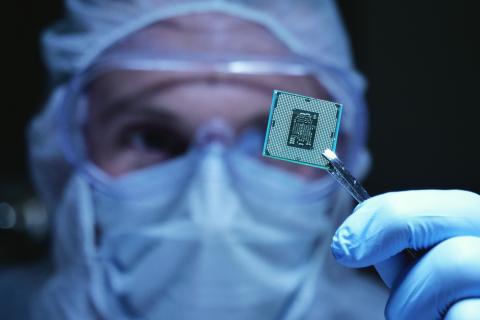Valo Therapeutics Acquires PeptiCHIP Technology Enabling Rapid Identification of Tumor Antigens for the Development of Personalized Immunotherapies

Helsinki, Finland, 26 July 2022: Valo Therapeutics Oy (ValoTx), the developer of novel, adaptable immunotherapy platforms for cancer and infectious diseases, announces the exclusive licensing of intellectual property rights (IPR) from the University of Helsinki, Finland, for the institution’s innovative PeptiCHIP technology. Following further validation by ValoTx, and the achievement of specific milestones, the IPR will transfer in full to the company. This is a strategically important addition for the company as it will enable the rapid identification of tumour antigens for the development of new cancer immunotherapies using Valo’s existing technologies and opens the possibility for a tumor specific personalized approach in the future. In addition, due to the advantages PeptiCHIP offers in comparison to existing antigen identification approaches, ValoTx expects to be able to commercialise the technology through creating a revenue-generating business unit.
Paul Higham, CEO of ValoTx, commented, “Precisely knowing the antigen profile of a tumor is crucial in developing new and effective immunotherapies in the treatment of cancer and particularly so when developing a personalized approach. PeptiCHIP enables us to identify these antigens faster than existing technologies and, in combination with our lead delivery platform, PeptiCRAd, we see significant potential for the development of personalized cancer immunotherapies across a wide range of cancers both for our partners and in-house programmes.”
The PeptiCHIP technology consists of a microfluidic chip for identification of neoantigens, coupled with a software algorithm that identifies immunogenic peptides. Together, the device and software form an easy-to-use lab tool that enables the fast and accurate identification of tumor antigen profiles.
Dr Sari Pesonen, CSO of ValoTx, added, “This is another successful IP acquisition from our long-standing innovation partnership with the University of Helsinki. PeptiCHIP technology opens new avenues for partnerships and our in-house programmes focused on new and personalized immunotherapies for the treatment of cancer.”
The PeptiCHIP technology is expected to facilitate neoantigen identification at a lower cost and requiring less tumor material compared to current methods. This should lead to faster tumor antigen identification in standard biopsy clinical workflows.
Helsinki Innovation Services Ltd, an innovation and commercialization company owned by the University of Helsinki, managed the intellectual property rights for PeptiCHIP and the commercial negotiations with ValoTx.
About ValoTx
Valo Therapeutics Oy (Helsinki) is an immunotherapy company that is developing antigen-coated oncolytic viruses and vaccine vectors as therapeutic vaccines against cancer and infectious disease. The ValoTx lead platform, PeptiCRAd (Peptide-coated Conditionally Replicating Adenovirus), was developed out of the laboratory of Professor Vincenzo Cerullo at the University of Helsinki. It turns oncolytic adenoviruses into targeted tissue specific cancer vaccines without the need to generate and manufacture multiple genetically modified viruses. The company is also developing PeptiENV and PeptiVAX, among other neoantigen strategies, in collaboration with Professor Cerullo. PeptiENV is expected to improve the therapeutic response to oncolytic enveloped viruses in the treatment of multiple forms of cancer, while PeptiVAX is a program to develop a novel, adaptable anti-infectives vaccination platform. The lead PeptiVAX project is a T-cell pan-Coronavirus vaccine. The company’s PeptiCHIP technology enables the rapid and accurate identification of tumor antigens.
About PeptiCHIP
PeptiCHIP is a novel microchip-based solution that enables rapid, accurate, user-friendly, and standardized tumor neoantigen identification from small tumor biopsies.
By addressing the technological limitations that are a major hurdle for the clinical translation of cancer immunotherapies, it will offer more meaningful and cost-effective neoantigen identification for immunotherapy companies, clinicians, and researchers. The technology is particularly valuable for those looking to validate antigens that can be used for the clinical development of dendritic cell-based therapies, T-cell receptor designs, monoclonal antibody creation, or as the coating of oncolytic viruses.
Personalized cancer immunotherapies that depend on the accurate identification of tumor neoantigens include autologous dendritic cell-based vaccines, neoantigen-specific antibodies, and neoantigen-coated oncolytic viral vectors. However, currently available neoantigen identification methods have significant limitations: they are time-consuming (weeks to months), laborious, expensive, and inaccurate, as they rely on the prediction of MHC-mediated peptide presentation. Alternative direct chromatography-based detection techniques are available, but their requirement for tumor material far exceeds the quantities obtained in tissue biopsies, preventing clinical neoantigen analysis altogether. Moreover, very few laboratories are sufficiently equipped to identify neoantigens, which impedes research and development of novel neoantigen-based immunotherapies.
Unlocking the full potential of cancer immunotherapies therefore requires more accurate, sample-conserving, and cost-effective methods to identify immunogenic neoantigens that will permit effective targeting to the patient's tumor. Together with the HEX software algorithm for selection of the most promising neoantigens, PeptiCHIP has the potential to overcome the hurdles in the clinical translation of personalized cancer immunotherapies due to its innovative technical features:
- Accuracy: precise identification of tumor neoantigen signatures is an absolute prerequisite for development of effective personalized immunotherapies. PeptiCHIP purification enables direct determination of neoantigen signatures, unlike the sequencing-based or other microarray chip-based technologies, which merely predict the peptide signature expressed on the tumor cell’s surface.
- Speed: processes tumor material at an unparalleled rate – within 1 hour – compared with at least 48 hours for competing technologies.
- Low sample requirement: no sample is lost in the closed system, in contrast to standard methods that involve a substantial loss of valuable tumor material due to multiple ultracentrifugation and chromatography steps. Since the requirement for tumor material is much lower compared to current state-of-the-art, PeptiCHIP is compatible with current clinical tumor biopsy practices.
- Cost-saving: the running cost for PeptiCHIP-based analyses is significantly lower than that of the less accurate and cumbersome state-of-the-art.
- Convenience: PeptiCHIP is easy to integrate into existing analysis workflows. It is quick and easy to use and does not require additional training or specialized biochemical personnel.
Contacts
Valo Therapeutics Oy
Matthew Vaughan
Email: info@valotx.com
Scius Communications (for ValoTx)
Katja Stout/ Daniel Gooch
Phone: +44(0)7789435990
Email: katja@sciuscommunications.com/ daniel@sciuscommunications.com

